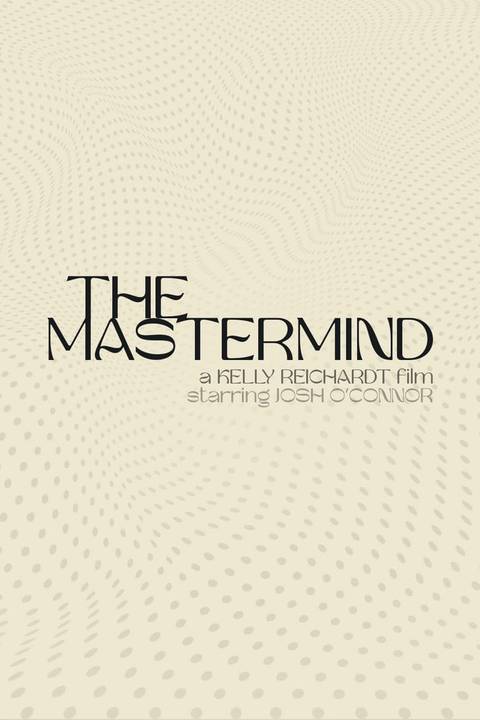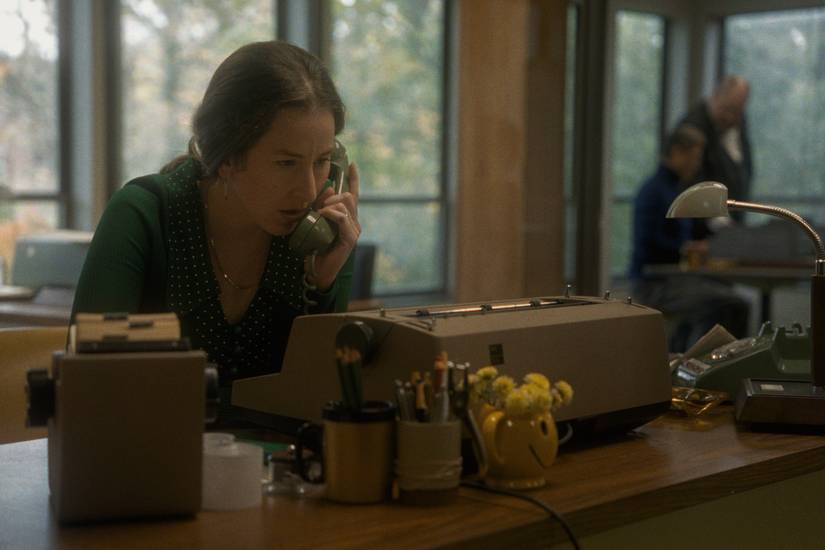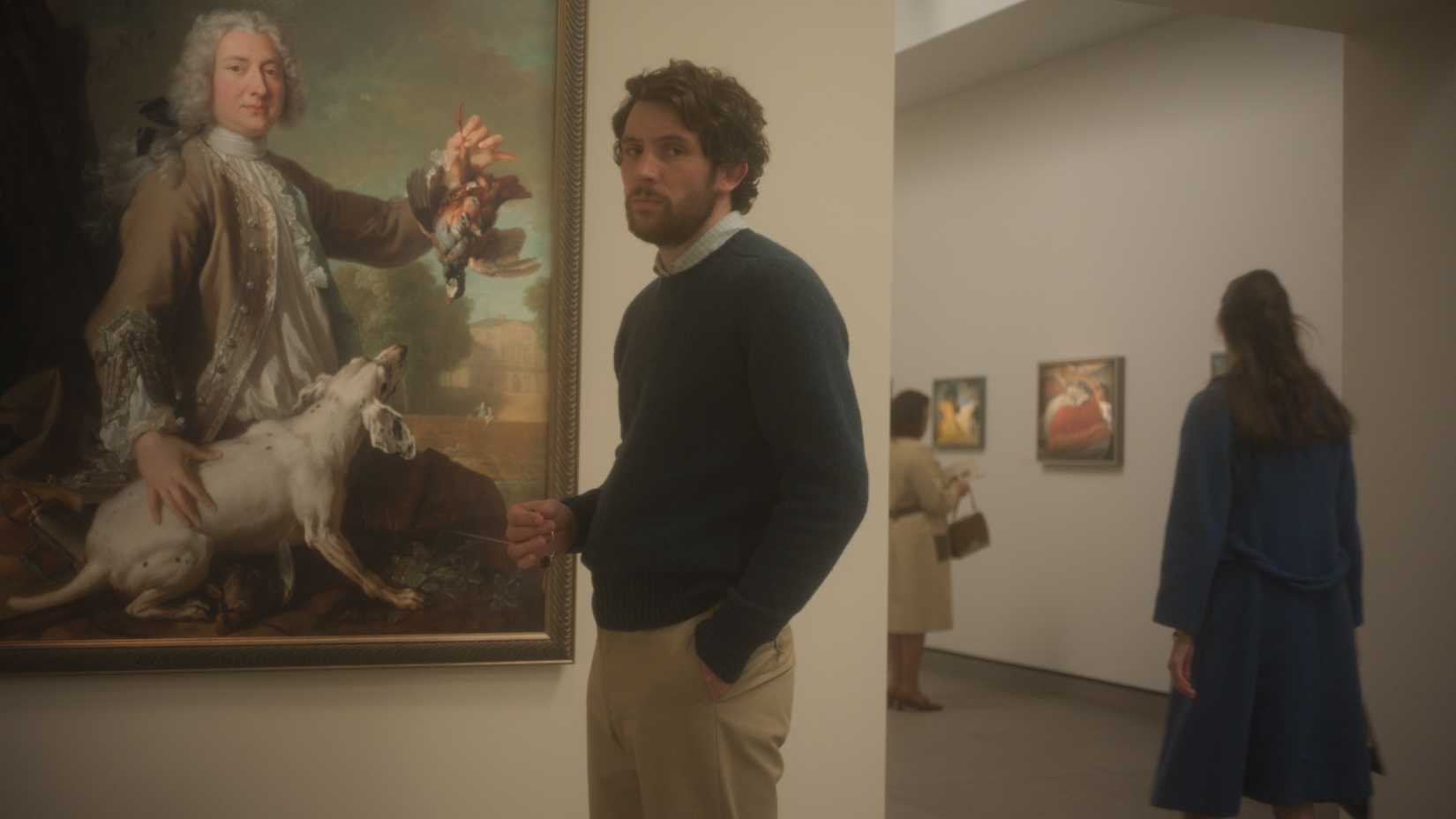The Mastermind is ostensibly a heist film, but it’s really the story of a middle-class male in 1970s Massachusetts who attempts to steal the objects of someone else’s success to compensate for his inability to achieve. All of which is to say that The Mastermind is another detail-oriented, genre-bending and altogether terrific film from director Kelly Reichardt, one where story and character are conveyed in small strokes that leave much for the viewer to consider. As only she can, Reichardt delivers a low-key, frequently funny and increasingly damning portrait of a self-sabotaging American whose shortcut to self-realization results in a multi-state effort to escape his responsibility to his fraying family and his fractured society.
That self-sabotaging American is J.B. Mooney, and he is played by Southampton-born Josh O’Connor (Challengers), in a fabulous performance of shambolic, bone-deep melancholy mixed with just a hint of buffoonery. It’s a testament to O’Connor’s skill that he so easily blends the conflicting aspects of Mooney’s personality, creating a sad-sack, disillusioned family man who we root for despite knowing that his downfall is inevitable. An art school dropout turned out-of-work carpenter, Mooney is, by all contemporary accounting, both a nice guy and a dolt. But the canvas upon which he applies the lazy brushstrokes of his underachieving life is small enough that he’s managed to keep himself out of trouble. That changes when he hatches — or, more accurately, lightly sketches — a plan to steal four paintings from a local museum.
A Heist Film Like No Other

- Release Date
-
October 17, 2025
- Runtime
-
110 minutes
- Director
-
Kelly Reichardt
- Writers
-
Kelly Reichardt
- Producers
-
Anish Savjani, Neil Kopp, Vincent Savino
Heist films generally go in two directions — they’re either tense, bare-knuckled dramas or snazzy, upscale capers. But Reichardt, who also wrote The Mastermind‘s screenplay, takes a less-traveled third route that’s more aligned with something the Coen brothers might have cooked up. Indeed, Fargo’s hapless Jerry Lundegaard may recognize a kindred spirit in J.B., a man who’s not quite as smart as he thinks he is. His family would agree with the sentiment: He repeatedly borrows money from his exasperated mother (Hope Davis) and absorbs the dinner table barbs of his disapproving father (Bill Camp). Despite having a wife and twin boys, J.B. drifts around the edges of his own life, stagnant and disconnected from his culturally ingrained definition of middle-class success. He’s a man of such limited ambition that the target of his heist isn’t a Rembrandt or a Monet, but rather four works by the late American abstract painter Arthur Dove that hang in the mid-tier Framingham Museum of Art.
Reichardt trod similar criminal territory in the more traditionally suspenseful Night Moves, but here J.B.’s master plan is so comically basic that its most creative element is the canvas bags hand-sewn by his wife, Terri (an underutilized Alana Haim) and used to transport the stolen paintings. During the heist, Reichardt’s simple camera placement and blocking echo just how little thought went into the whole thing. In fact, before one of J.B.’s henchmen enters the museum, he mutters, “here goes nothing,” which sums up this vaguely planned, broad-daylight robbery that consists of little more than shoving the paintings into the canvas bags and running out the door. Only when Ronnie (Javion Allen), J.B.’s other co-conspirator, pulls out a gun during the getaway does his lack of inspiration — in criminal planning and in life — lead to serious trouble.
A Perfect Evocation of the 1970s
With a pair of detectives closing in, J.B. goes on the run, which gives Reichardt plenty of opportunity to envelop us in the shapes, colors and textures of the Vietnam-era Midwest (the film was mostly shot in and around Cincinnati, Ohio). Reichardt’s go-to cinematographer, Christopher Blauvelt, working with production designer Anthony Gasparro and costumer Amy Roth, delivers slightly faded autumnal images that are so subtlety evocative that the film might as well have been shot in the ’70s. The attention to detail is so precise, it includes choice props like those old school, egg-shaped packages of L’eggs pantyhose that J.B.’s crew uses as masks and the hand-cranked rear window on his getaway station wagon.
Even the buses that ferry J.B. around the Midwest region could use a good washing, including the one that takes him to the countryfied home of his old friends Fred and Maude (Reichardt regular John Magaro and the terrific Gaby Hoffman). When Fred suggests that J.B. escape the law by hightailing it to Canada to join “the draft dodgers and radical feminists,” J.B. declines, saying that they’re not his people — which is to say people with strong convictions, political or otherwise. It’s around this time that Reichardt begins foregrounding the Vietnam War, suggesting that J.B. cannot separate himself from the wider world and his role in it, no matter how far he runs. The only complicated shot in the entire film is a telling one: It’s a 360-degree pan of J.B. in a hotel room, doctoring his passport while ignoring TV news footage of American soldiers in Cambodia.
Reichardt is no stranger to sprinkling some political pixie dust over her films, as she did in Wendy and Lucy and First Cow. On that note, one potential theme of The Mastermind is the impossibility of keeping your head in the sand while political controversies overtake the world around you, a message that Reichardt delivers with a bit of humor and puck. We hear it in composer Rob Mazurek’s jazzy score, which seems to compliment the movie J.B. thinks he’s in. And we see it in the ironic title Reichardt has chosen for her latest quietly observational character piece. At one point, J.B. responds to a tough question by saying, “Just give me a minute to think.” The problem is that no matter how many minutes he’s given, he still comes up with the wrong answer.
The Mastermind, from MUBI, opens in theaters on October 17.




